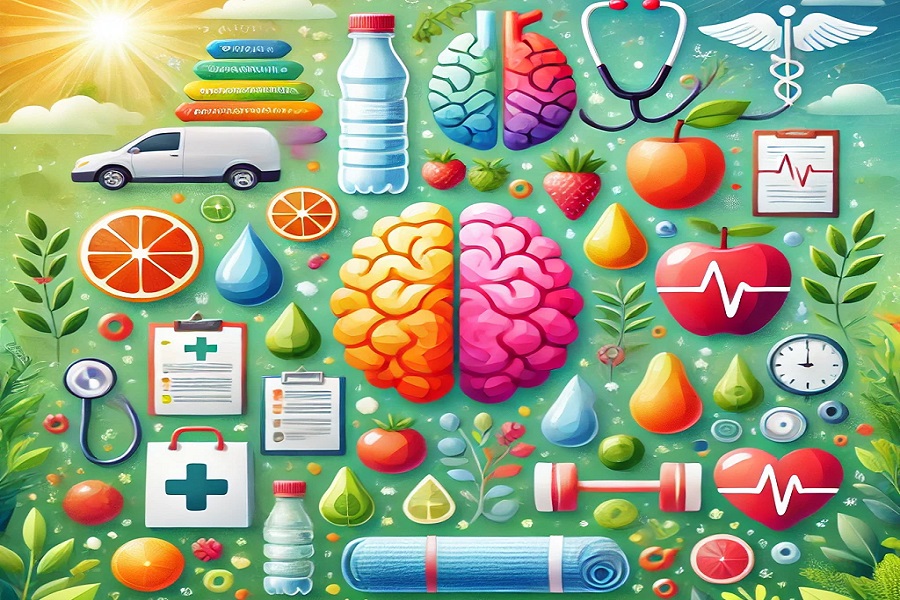
Follow us Now on Telegram ! Get daily 10 - 12 Interesting Updates. Join our Telegram Channel https://t.me/OhWomen
Download Telegram App before Joining the Channel
Health is often seen as the balance of physical well-being, mental clarity, and emotional stability. A holistic approach to health embraces all aspects of a person’s life, focusing on maintaining equilibrium between nutrition, exercise, mental health, and preventive care. Achieving this balance is essential for a long and fulfilling life, and it’s important to recognize that each aspect of health supports the others. By making conscious choices in how we eat, move, rest, and care for our mental health, we can improve not only our longevity but also our quality of life.
The Importance of Balanced Nutrition
Proper nutrition is the cornerstone of good health. The foods we consume provide the essential nutrients that fuel our bodies and enable us to perform our daily tasks. A balanced diet rich in fruits, vegetables, lean proteins, healthy fats, and whole grains helps to prevent chronic diseases such as heart disease, diabetes, and obesity.
Incorporating nutrient-dense foods into our meals ensures that our bodies are receiving the vitamins, minerals, and antioxidants they need to function optimally. For example, vitamin-rich fruits and vegetables support immune health, while proteins and healthy fats contribute to muscle repair and brain function. Drinking sufficient water throughout the day also plays a critical role in maintaining hydration and supporting bodily functions like digestion and circulation.
Exercise: Moving Towards Physical Wellness
Physical activity is another pillar of health. Regular exercise not only keeps the body in shape but also supports mental clarity and emotional stability. Whether it’s cardiovascular exercises like running or swimming, strength training, yoga, or simple stretching, engaging in physical activity has numerous benefits for the body.
Exercise improves cardiovascular health, strengthens muscles and bones, increases flexibility, and boosts the immune system. Additionally, it releases endorphins, the body's natural “feel-good” chemicals, which help to reduce stress, anxiety, and depression. Regular physical activity also promotes better sleep, increases energy levels, and improves cognitive function.
It's important to find a form of exercise that you enjoy and can maintain in the long term. This might mean participating in group fitness classes, going for daily walks, or practicing yoga at home. No matter the activity, consistency is key to reaping the benefits of exercise.
Mental Well-being: Caring for the Mind
While physical health is essential, mental health is equally important. The state of our mental well-being directly affects how we interact with the world and cope with challenges. Mental health encompasses our emotional, psychological, and social well-being, influencing how we think, feel, and behave.
Managing stress, anxiety, and depression is a critical part of maintaining mental health. Practices such as mindfulness, meditation, journaling, and talking to a therapist can help to reduce the negative impacts of stress and improve overall emotional resilience. Positive social connections and meaningful relationships also play a significant role in mental well-being. Surrounding ourselves with supportive friends and family, as well as engaging in activities that bring joy and fulfillment, can help to foster emotional balance.
Additionally, ensuring adequate sleep is vital for both mental and physical health. Sleep allows the body to rest, recover, and rejuvenate, and poor sleep can contribute to a range of health issues, including cognitive decline and weakened immunity.
Preventive Healthcare: The Power of Prevention
Taking a preventive approach to healthcare is one of the most effective ways to maintain long-term health. Regular check-ups, screenings, and vaccinations are key aspects of preventive care that help to catch potential health problems early before they develop into more serious conditions. Preventive measures can significantly reduce the risk of diseases, ensuring a higher quality of life as we age.
For instance, regular blood pressure and cholesterol checks can help detect early signs of heart disease, while cancer screenings such as mammograms and colonoscopies can identify abnormalities in their early stages, when treatment is most effective. Vaccinations protect against preventable diseases, keeping individuals and communities safe from outbreaks.
Moreover, preventive care isn’t just about physical check-ups. Mental health screenings and self-care practices also play an essential role in early detection and prevention of mental health conditions. The earlier we address health concerns, the better the outcomes in both physical and mental wellness.
The Holistic Health Approach: Connecting the Mind, Body, and Spirit
Holistic health is an integrated approach to wellness that emphasizes the connection between the mind, body, and spirit. It involves taking care of all aspects of a person’s life to achieve overall health and happiness. Holistic health goes beyond just treating illness—it focuses on the prevention of disease and the promotion of a healthy lifestyle through balanced nutrition, physical activity, mental health practices, and preventive care.
This approach encourages individuals to be more mindful of their daily habits and choices. It involves making health-conscious decisions that nurture not only the body but also the mind and spirit. Practices such as yoga, meditation, and mindfulness are often part of holistic health routines, as they help to connect the individual to their inner self and foster a sense of calm and well-being.
Conclusion: A Lifelong Journey to Wellness
Health is not a destination but a lifelong journey. By adopting a holistic approach to health, we can create a balanced and fulfilling life. It’s important to take small, consistent steps to improve our habits and make choices that benefit our bodies, minds, and overall well-being. Whether through eating nutritious foods, staying active, nurturing our mental health, or seeking regular check-ups, we are empowered to make decisions that support a healthier, happier life.
Incorporating these elements into our daily routine can help us achieve not just physical health, but mental clarity, emotional stability, and long-term vitality. By making health a priority, we can enjoy a better quality of life, while preventing the onset of illness and disease. The key is balance-and embracing health in all its forms.
Source - OhWomen